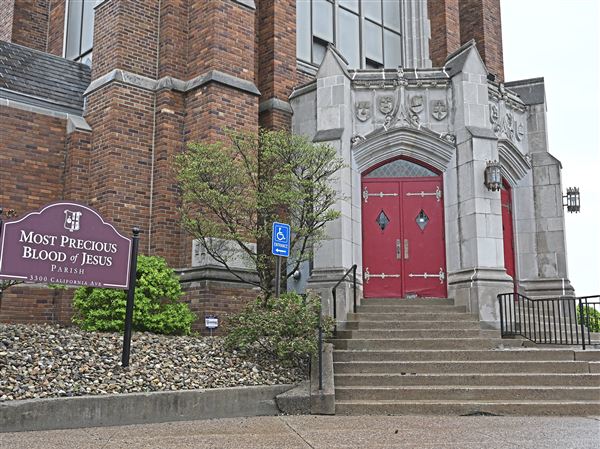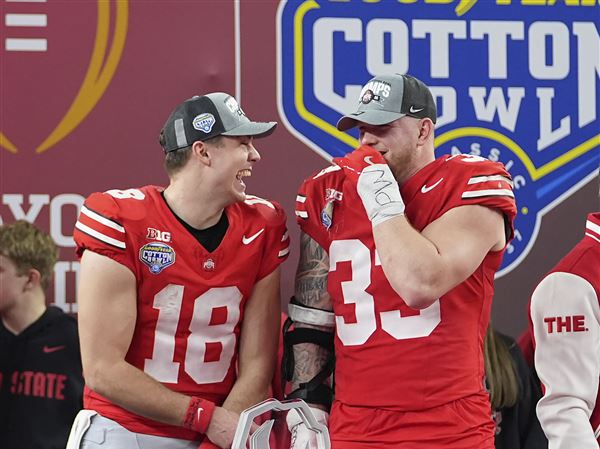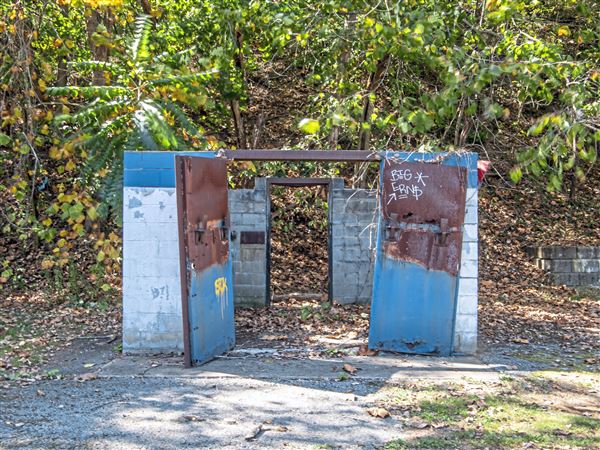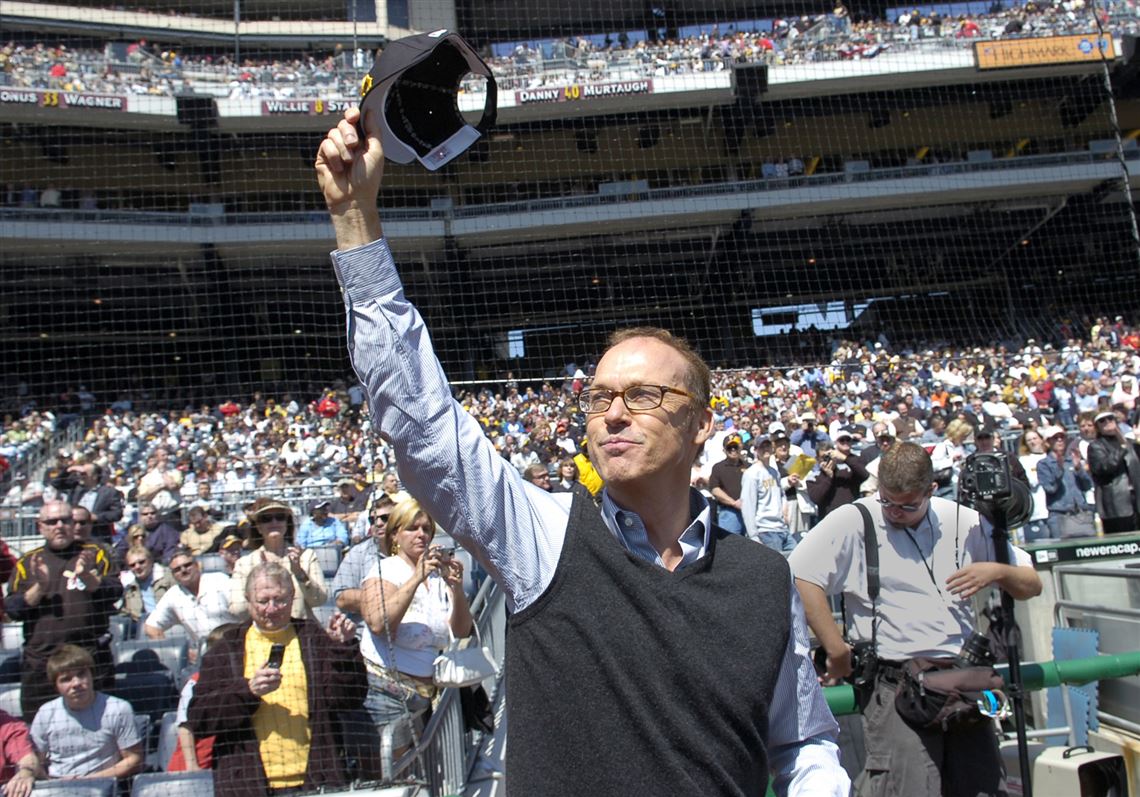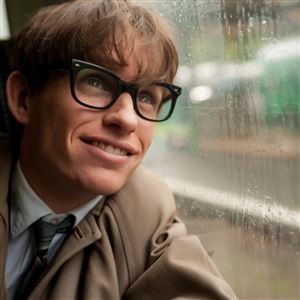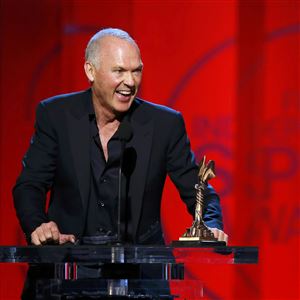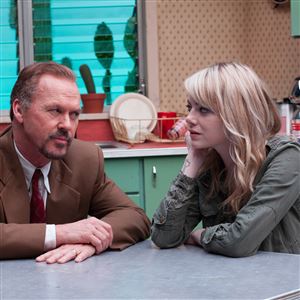No matter what happens between 11:30 p.m. and midnight on Feb. 22 — Oscar night — Michael Keaton's life has been changed forever in the best way possible. He will either be known as an Oscar nominee or winner, thanks to "Birdman."
The night of his Golden Globe win, he celebrated his Pittsburgh roots and his real name of Michael Douglas (already taken by a couple of other show-business mainstays). He grew up in the Forest Grove neighborhood in Robinson as the youngest of seven children of the late George and Leona Douglas.
He more than paid his dues, acting in Oakland with the Pittsburgh Poor Players in "Sticks and Bones" and for Don Brockett in the "New Amen Show" at Ben Gross Restaurant in Irwin. He did stand-up comedy at the Top Shelf, Downtown, worked on the crew for "Mister Rogers' Neighborhood," flew to New York to play the comedy clubs and then moved to Los Angeles in the mid-1970s where he found work in the clubs, on TV and then film.
He broke through with the big-screen comedy "Night Shift," and the rest is Hollywood history.
As we build to the Film Independent Spirit Awards and the Academy Awards Feb. 21 and 22, a look back at five stories on the Pittsburgher turned Batman turned Birdman.
Michael Keaton off to fast start in ‘working stiffs’
By Barbara Holsopple / The Pittsburgh Press
June 19, 1979
HOLLYWOOD - Pittsburgh’s Michael Keaton will be seen in his third TV series this fall, as Jim Belushi’s co-star in CBS’ “Working Stiffs.”
As the idea man in a team of inept brothers prone to unemployment, Keaton gets his first chance to carry a show.
Last season, he was a supporting player in both of Mary Tyler Moore’s ill-fated shows. Two seasons ago, he played the flippant administrative assistant in Norman Lear’s political comedy, “All’s Fair.”
Keaton’s reputation has been built on his ability to chew up a line and toss it out with a nonchalant cool that exists mostly in his own mind. He was the guy who might offer to fix a parking ticket for a gorgeous girl, only to discover she’s a meter maid.
This time around, the egg on his face will be real.
“Working Stiffs” is slapstick comedy, and Keaton admits he’s still feeling his way despite an admirable performance in the pilot episode.
“I don’t know yet how the difference in comedy will affect me,” he says. “This is the first time I’ve done physical comedy. I admire it. I have a lot of energy and I move around a lot in my club act. The important thing for me right now is to try new areas to explore.”
Keaton’s club act was on display last week at Los Angeles’ famed Comedy Store, a haven for standup comics. It probably will be his last such appearance before “Working Stiffs” goes into full production.
His career actually began in drama. As a student at Kent State University in Ohio, he appeared in dramatic productions before dropping out of school and returning to Pittsburgh.
Back home, he worked with several theater groups, still doing drama.
But he was interested in comedy and began writing his own material and appearing in clubs around the university campuses before going to New York, where David Brenner caught his act and told him he was “terrific.”
Moving on to Los Angeles, he was spotted by Robert Kline and hired for one of Kline’s TV specials. He’s been going strong ever since, and won his role in “Working Stiffs” on reputation alone, without an audition.
His real name is Michael Douglas, an obvious problem for any young man attempting to crack show business.
“I found my new name in the phone book,” he says. “I wanted something simple. I tried Keats but I thought that was a little pretentious.”
Keats or Keaton, he has a certain prestige in having worked with Miss Moore, especially in two series that bombed. He handles questions diplomatically.
“I happen to have a big crush on Mary, so I get a little defensive when I’m asked what happened,” he says. “For Mary, it was a hard thing to go through.
“Why didn’t the shows work? I’d rather not talk about it, because a lot of people would be hurt. It’s over. I can only speak for myself, and they gave me all the freedom in the world to write my own lines and work my scenes.
“From the experience I learned to trust my own instincts. I think my instincts were generally right. I think I did some good stuff on those shows.”

Aug. 14, 1985: Michael Keaton during a break in the filming of "Gung Ho," which was shot in the Pittsburgh region. (Andy Starnes/The Pittsburgh Press)
‘I always, always wanted to do this’
By Barbara Holsopple / The Pittsburgh Press
Published Sept. 23, 1979
Michael Keaton moved to Los Angeles from Pittsburgh four years, three months and two weeks ago. And he's homesick.
But Keaton, starring in CBS’ new “Working Stiffs,” has been very successful indeed, in the unemployment capital of the world. From stand-up comedy routines in L.A.’s famed comedy clubs, Keaton quickly landed roles in “The Tony Randall Show,” “Maude,” “All’s Fair” and two Mary Tyler Moore series, before winning his current status as the bumbling brother doing janitorial duties with Jim Belushi each Saturday night at 8.
When time permits, he still plays the comedy clubs. He tells his West Coast audiences how different it is to live on the Pacific beach, where marine life is a little more sophisticated than the occasional “rusty Chevy” found in the Mon River.
Ask him how to get from one body of water to the other and a look of wonderment crosses his face.
“I think I always, always wanted to do this,” he says. “You fantasize ... I had a real strong fantasy life as a kid. But then you grow up and think about real jobs.”
Keaton held a few blue collar jobs but the fantasies of show business wouldn’t die. In college — briefly — at Kent State University he majored in speech and auditioned for plays. “But academia was not where I wanted to be,” he says.
“My parents were very good about it. By the time I dropped out of school I had been through a lot of changes. People of my generation went through a lot of confusion, and this may have appeared to be just one more thing.”
Youngest Of Seven
Born Michael Douglas — he changed his name for obvious reasons — Keaton is the youngest of seven children. He believes his genes may have something to do with his life today. “There just is not one person in my family who is not funny,” he insists. “I had the advantage of being the youngest — you have a built-in audience. Once you get the assurance that what you do is funny, you begin thriving on it.”
But funny for the family isn’t enough. “In high school, I was too shy to perform. It’s one thing to get laughs from your family, to be funny at parties and in class. It’s another thing to get up on the stage. In college, my curiosity probably just got the best of me ...
I thought, why not? I was never surprised when I found I could do it. It was always in the back of my head, I think.”
His first performance as a comedian on a stage was in a jazz club in downtown Pittsburgh. “I don’t know how this happened,” he says, shaking his head. “I just wrote seven minutes of material and talked them into letting me do it. I worked one day a week and I often failed miserably. Mostly I was doing words, no real ad-libbing, no improvising. I know I had some decent material but I was in the wrong environment… the audience was there to hear jazz, not comedy. But it was good experience. If you work the bad rooms it makes the good ones better.”
Soon Keaton was flying to New York to play the comedy clubs there. “I never lived in New York. I’d work on my material at home and when I had enough, I’d go to New York and stay a while. I never had any money. I worked on the production crew at WQED for a while and I think I learned something about this business. All of my jobs were important. Actors have a tendency to be sheltered. They are babies and people baby them, which amazes me.”
It was on the sidewalks of New York outside a club called Catch A Rising Star that Keaton made the decision to wade into show business fulltime. “I saw David Brenner and I said, ‘If you’re smart, there’s a new comedian you want to see.’ He stopped in and was very complimentary. I’m sure he’d never remember it — I didn’t bring the house down or anything like that — but it was a nice moment. I think he just wanted to encourage me.” It was encouragement enough to send Keaton to L.A. Doing various jobs to keep his stomach happy, Keaton also played the Comedy Store. He was spotted by Robert Kline, who eventualy hired him for a TV special. “I really felt wonderful,” Keaton recalls. “He was one of my favorites. To be picked by one of your favorites is the ultimate.”
He-was on the bill at the Comedy Store the night Tony Randall’s producers, Jay Tarses and Tom Patchett, stopped by. “The next day, they offered me a two-parter on Randall’s show. I played Zeke Zacharius, a motorcycle guy who looked like he had maybe done too many acid trips in the ’60s ... slow, but sincere ... real basic.”
‘Maude’ Role
Former WQED producer Charlie Hauck — for whom Keaton once wrote jokes — became producer of “Maude.” “Hauck probably set me up for an interview and audition — I never knew for sure — but I got hired to play a radio sports reporter. I was real scared.”
Down the hall, the writers and producers of CBS’ short-lived “All’s Falr^ were looking for a smartmouthed political flak for one episode. Keaton won it. “That was the first time I felt I could improvise a bit,” he recalls. “It became a two- part guest shot and then a recurring character. I was in eight episodes.”
From that came the first Mary Tyler Moore series of last season, in which Keaton was a member of the variety show’s comedy troupe. When Miss Moore ended production to go back to the drawing board, Keaton was the only cast member to be retained for the new show.
Keaton’s experience has taught him the politics of show business. “All the shows I worked on were good,” he says, and he's got something nice to say about any individual whose name comes into the conversation. He is especially cautious and guarded when the obvious question is asked: Why did TV’s sweetheart bomb twice in one season?
"Man, who could ever figure that out? She’s my friend and a real nice lady. I learned a lot from her. She’s incredibly easy to work with and she’s good, she’s better than people know she is. She used to underplay a lot, and she used to stretch a lot, too. She was sometimes made to do things that just weren’t right for her and she never balked. I have a tendency to say, ‘I’d like to work on this’ but Mary would just stretch for whatever they asked of her.’’
Analysis of failure is an exercise in futility, at least in television, Keaton believes. “It always comes down to people sitting in their homes and watching you. They don’t say, ‘That didn’t work because it was constructed wrong.’ The final product is just your face, doing it.”
Working Stiffs is a departure for Keaton in that it is slapstick comedy. Asked about problems with Belushi — who walked out of one interview when his brother John’s name was mentioned — Keaton is cautious. “I think Jim and I work well together, but we don’t want to end up as a team.”
“Working Stiffs” has not had early ratings success. Whatever the future, Michael Keaton is an established member of the Hollywood work force. But Pittsburgh is still home. He talks of coming back here to work.
“I love Pittsburgh — it’s nice and homey,” he says. “I miss the ethnic people — they add color we don’t have out here. You get real spoiled out here ... fresh squeezed orange juice and mushrooms that look like they’ve been grown near a nuclear power plant. But if I could figure out a way to get some Rolling Rock beer out here, I’d be a real hero with my friends.”

Aug. 14, 1985: Michael Keaton during the filming of "Gung Ho," which was shot in the Pittsburgh region. This softball scene was shot in Duquesne. (Andy Starnes/The Pittsburgh Press)
‘Gung Ho’ crew kicks up dust in Duquesne
By Ed Blank / The Pittsburgh Press
Aug. 15, 1985
Coraopolis-born Michael Keaton stood to the third-base side of the infield in fine, inch-thick dust.
Ron Howard was near the pitcher’s mound, his loose white trousers so dirty from the knees down he generated brown clouds around himself every time he moved.
Actor Keaton and actor-turned-director Howard were in Duquesne yesterday on the first day of their Pittsburgh area shoot for “Gung Ho,” a comedy about business and cultural relations between the American workers in a small-town Pennsylvania auto factory and the Japanese managers who have just assumed control.
The “Gung Ho” gang shot for five days early last month in Japan, then moved for three weeks to the huge Sevel Auto Factory in Buenos Aires, Argentina.
The rest will be shot from now until about Sept. 20 in and around such locations as the South Side, Shadyside, McKees Rocks, Troy Hill, the Allegheny County Airport and eastern Ohio, which collectively will represent the fictitious industrial town of Hadleyville, Pa.
First to be filmed here, at Polish Hill Memorial Field in Duquesne, were bits of a softball game between Japanese and native Americans that occurs about one-third into the story.
At times, a stationary camera and a hand-held camera braced about a cinematographer’s shoulder were filming concurrently. One was getting shots of two American pitchers warming up near third base. The other picked up infield drills of the Japanese team.
Howard, in a baseball cap (“National Hamburger League”) and jersey, stood amidst the extras, photographers and aides like a benevolent ringmaster, speaking louder than anyone else but never with urgency.
The former child star of “The Music Man,” “The Courtship of Eddie’s Father,” “The Andy Griffith Show,” “Happy Days” and “The Shootist” is making good so consistently as an adult director that if there ever was any pressure to succeed immediately, it has dissolved in a comfortable cushion of confidence.
His low-budget “Grand Theft Auto” (1979) paid the kind of dividends that turn novices into Wunder- kinds with more money to spend next time. His “Night Shift” (1981), with Keaton and Henry Winkler, was a hit, his “Splash” (1984) a megabit and his current “Cocoon” a blockbuster that is among the season’s three biggest hits.
Each has been more popular than the one before.
En route to an outdoor picnic table, Howard surrenders without hesitation to locals who had been waiting on the sidelines for a chance to shake his hand or to be photographed with an arm around his waist. The city of Duquesne has a new Mr. Nice Guy.
“Thanks, Mr. Howard,” says one after another.
A moment later he relaxes, to the extent possible, in the corner of a long table for a cold pasta salad.
“Chances are always kind of slim you’ll have a hit,” he says, forking a hunk of cantaloupe without immediately eating it. “But a new thing has come to pass that I’m real happy about: Most of the studios don’t expect hits. They don’t expect dismal failure^, either, but hits are getting rarer, and they know that.
“Now it’s possible to feel that if you make a good film, if you’ve done a good job, you’ll get another opportunity. One of the writers told me it’s like being a big-league manager. Unless you really foul up, you’ll get another chance somewhere.”
“Poltergeist” director Tobe Hooper had said he felt blackballed for a couple of years despite his picture’s great success.
“I don’t know Tobe personally,” Howard said, “but I don’t think people so much get blackballed as they go cold for awhile.
“The thing is whether you can bring it in on time and on budget and make it as good as you can. Then, if it’s a fiscal failure, at least you can keep going.”
Howard’s lunch, which had been brought to him by an aide, was from one of two catering vans a quarter of a mile apart at opposite ends of the ballfield.
The crew and most of the actors with speaking parts, at least in yesterday’s scenes, queued up by the van atop a hill beyond home plate. Non-speaking-role extras strolled beyond the outfield to their own van.
Frank Seals, a veteran extra from such Pittsburgh-based movies as “The Fish That Saved Pittsburgh” and TV’s “Silent Witness,” was pleased as can be to strip off the top ayer of his costume, an umpire’s vest, and dine at the V.I.P. van.
Born and raised in the Hill District and living now on the North Side, Seals has been unemployed for four years except for the work he picks up here and there from Clayton and Sharon Hill’s locally based Sharclay casting agency.
First Seals wants a match for a cigarette from a freshly opened pack — “You got a match? Hey, buddy, need a match. I’m gonna smoke a lot of cigarettes today.” Then he talks eagerly of his speaking part.
“I didn’t believe I’d get it. They were looking at someone else who’s better known around here, but they called me. Two days’ work, $361 per day plus meals, good meals. Don’t you go getting me in any trouble now. You better ask if you can use that. I don’t know what it’s OK for me to say.”
Seals is on top of the world. He’s one of just 11 locals with lines to say, and he knows ’em inside out: “Strike!” “Ball!” and “You’re out!”
Tomorrow he’ll be scratching for work again. You take what you can get. Today he’s having lunch a few feet from Ron Howard.
Nearby is one of the people who hired Seals, Clayton Hill.
Sharclay had not had to tap-dance to get the job of local casting, Hill said.
“We got a call. They asked us if we wanted to do it. I’m not sure how it happened. Producers and directors talk with each other. They find out who has done other pictures in the area.”
Although Holt/Belajac had cast “Flashdance,” Sharclay has gotten most of the other TV and feature films shot in whole or in part here.
The challenge for the Hills this time was finding Japanese ballplayers. Most of the casting for such parts finally was done in Columbus, Ohio, and New York.
Other extras were rounded up by Bill Bartman and aide Jim Cash.
“The usual way of doing this,” Bartman said, “is to advertise for extras and raffle off a TV to keep the people in the stands as long as needed (a practice used here when “The Fish That Saved Pittsburgh” was filmed). We decided to take the charity route.”
He and Cash approached five charities — the YWCA, Girl Scouts, Polish Falcons, Park Place American Methodist Episcopal Church and the Church of Latter Day Saints — each of which received $5 per extra brought to the site.
The extras populated the bleachers for softball scenes.
So did Steeler tight end Chris Kolodziejski (ko-la-jess’-skee), a second-round 1984 draft choice who was injured last October in a game against the Giants.
“Just an extra hanging around,” Kolodziejski said. “Don’t know when I’ll join (the Steelers) again. No sense trying to put a timetable on it. I got my ligaments blown out. Sustained a bone chip in my knee cap. The Steelers have got me back doing rehabilitation training for 2hours. I do it in the morning. Thought I’d see what’s going on here.”
A Los Angeles native who lives on Mount Washington, Kolodziejski declined at first to talk at all, incognito as he was, unshaven and minding his own business. But what the heck. It was hot and humid, and moviemaking can be slower than the growth of parched Pittsburgh grass in August.
Kolodziejski says he hopes retirement is “a long way off. I’d like to play football for five or 10 more years.”
Then a little more camera work himself, perhaps.
“When I went to Malibu Park Junior High and Santa Monica High School, Emilio Estevez and Sean Penn were a year behind me, and Kristy McNichol was about two years behind, although she left earlier.
“Sean was a surfer. Emilio was a hell of an athlete. He could have played football; he picked soccer.”
Kolo, as he’s called, picked the professional jock route, but holds performing as a trump-in-the-hole.
“I was in ‘Plaza Suite’ and a Tennessee Williams play in college (the University of Wyoming) ... I think if I were ever to call Emilio about it, he’d get me a shot at something.”
Nearby, another movie star was lunching in his trailer.
Michael Keaton, as it turns out, was as affable as one might expect a native-boy-made-good to be.
He minimized, mostly, his involvement in bringing the film’s production to his hometown.
“It’s mostly coincidental. The script had Hadleyville set in Pennsylvania anyway. Heading the script I saw that it could be shot here, but I didn’t say anything at first.
“Eventually I said to Ron (Howard), ‘You know, we could do that in Pittsburgh.’ He said, ‘I know. I’ve been thinking about that, but I didn’t want to get your hopes up.’ One hour after they saw the city they said, ‘This is it.’ ”
Keaton’s nieces, nephews, brothers and sisters will be turning up as extras, but as what or when, he isn’t sure.
Their name, in most cases, is Douglas. So is his, originally.
Michael Keaton — or Michael Douglas as he was born — had to change his name because Kirk Douglas’s son Michael (“Coma,” “Romancing the Stone”) and TV talk show host Mike Douglas (real name: Michael Delaney Dowd) already had appropriated the name.
“For awhile I considered calling myself Michael Murtaugh because I admired Danny Murtaugh so much. But I thought that sounded almost contrived. And then I considered Keats, but that sounded pretentious. I was in the K’s in the phonebook when I thought of Keaton.”
As in Diane.
“Right, yeah. Thought of her, too, and I’d like to work with her sometime.”
He was called to the set, but he’ll be around. With family and friends in Robinson Township, and his wife and 2-year-old son visiting temporarily, his visit to Duquesne is one of many in a homecoming he’s finding a real trip.

March 13, 1986: Michael Keaton jokes around at the reception for "Gung Ho" at the Mirage nightclub. (Bill Wade/The Pittsburgh Press)
Keaton fans, friends ‘gung ho’ at premiere
By Peter B. King / The Pittsburgh Press
March 14, 1986
Robinson Township-born actor Michael Keaton added some stand-up humor to the humor in his movie “Gung Ho” when he appeared at the film’s premiere last night at the Fulton I, Downtown.
His Pittsburgh jokes and the trays heaped with kielbasa at a party at the Mirage disco, next door, underlined the district’s connection to the Paramount picture — much of the movie was filmed here last summer.
Keaton, dressed conservatively in a black tweed suit, white shirt and red tie, arrived by Cadillac limousine at the theater at 6:50 p.m.
A line almost two blocks long cheered him, as “Entertainment Tonight” filmed the event. The crowd jammed the pre-screening bash at Mirage. And they packed the 1,460-seat Fulton, with most paying $15 a ticket. The event benefits the Parental Stress Center Inc., a South Side agency that fights child abuse. A center spokeswoman said: “I think it’s safe to say it’s a sellout.”
Keaton spoke to the crowd — which included 72 local extras and crew and five of Keaton’s six siblings — in Mirage and in the Fulton.
In thick Pittsburghese, Keaton said he was going to “pump an Iron.”
He shouted “Beat ’em Bucs,” and characterized Pittsburgh as a “no B.S.” and “no baloney” town.
Informed that Mayor Caliguiri was not able to attend, he said: “I say we go over and yank him out of bed.”
During the screening, Keaton filmed a public service announcement for WQED in the Fulton’s lobby.
His script read: “Y’know Pittsburgh’s a great town. There’s a lot of things you can miss around here...”
Trapper Jack Elliott of radio station WWSW emceed. Local celebrities tended bar at Mirage, including Debra Fox and Sally Wiggin of WTAE-TV, comedian Don Brockett, Councilwoman Michelle Madoff, former Pittsburgh policeman Vic Cianca, former Pittsburgh TV newscaster Jane Crawford, retired football great Franco Harris and Liz Miles of “Evening Magazine.”
Excitement and pride in Pittsburgh coursed through the crowd — many of whom had seen the filming or had been extras.
“We think we’re extras. For all we know, we’re on the cutting room floor,” said Phyllis Burns of Upper St. Clair.
Ten-year-old David Bittner of the East End was an extra, too. His part, he said, “was to pull some kid’s pants down.”
Judy Guidos of Beaver said of her non-speaking role: “It’s a thrill for a 33-year-old mother of two.”
One of Keaton’s brothers, Paul Douglas of Sewickley, remembered Keaton (whose real name is Douglas) as a funny child who did Elvis Presley imitations. Still, Douglas said his brother did “next to nothing” as far as acting when he was growing up and got no formal training.
Was the family surprised when Keaton hit it big? “Sure. So was he.” Most who saw the film last night liked it.
Elizabeth Malcolm of Wexford deemed it “excellent,” and liked the contrast between the cultures of the United States and Japan.
Sherry O’Connor of Bridgewater, Beaver County, liked it because “it had a lot to do with this area. And now maybe everybody out there can see what it’s like back here.”
“I think it was too hard on unions and the American employee,” said John Hoffman of McCandless.
“A little slow, a little dragged out,” pronounced Cindy Phillips of Sewickley. “I don’t think it was an award winner, but it was entertaining.”
“I think it was great to see a lot of our friends,” said Gregg Rivoir of Mt. Lebanon. “It’s hard to be objective about it.”

March 13, 1986: From left, Trapper Jack Elliott, Michael Keaton and Marie Reilly at the Mirage for his "Gung Ho" reception. (Darrell Sapp/Post-Gazette)
Caped crusader role gives Keaton Hollywood clout, choice of films
By Barbara Vancheri / Pittsburgh Post-Gazette
April 23, 1990
SANTA MONICA, Calif. — Even Batman gets the blues for Pittsburgh now and then.
“The other day, the girl who did my hair in this last movie — Michelle Payne, who’s from Pittsburgh — and I were sitting in the makeup trailer reading the weather. And it sounded like one of those 48-degree, gray days in Pittsburgh and I had this urge to be back there,” Michael Keaton said.
He wasn’t joking.
Keaton acknowledged how funny that might sound to Pittsburghers, who shivered under cloud-locked skies while Keaton basked in the sun’s golden glory. But California doesn’t have Pittsburgh’s sense of community and neighborhoods or Keaton’s family, “a pretty good barometer for authenticity,” he says.
After all, they can remember when he was just another kid at Montour High School, playing John the Baptist in a Don Brockett show, or running the trolley and rolling out carpet for “Mister Rogers’ Neighborhood.” As a member of the production crew at WQED-TV, he had been assigned to the children’s show in the 1970s.
The actor had strolled into a hotel coffee shop, a nice but unpretentious place, without the sort of fanfare or entourage one would expect of a superstar. Dressed in faded jeans, striped blue shirt and white tennis shoes, he looked more like Mr. Mom than Bruce Wayne, boy millionaire and winged avenger.
But it was “Batman” and its gross of $250 million — and counting — that boosted the actor into the stratosphere of celebrity. All of a sudden, scripts reportedly are going to Dustin Hoffman (dean of the serious actors) for consideration and then to Keaton or Richard Dreyfuss. Now that’s clout.
Talking about what “Batman” did for his life, Keaton said with a smile, “I’ve never been in anything this huge, and it happens to almost no one — ever. The chance of this happening to somebody, it’s so slim. I don’t even think about that. I’m just having a great time.”
A couple of months ago, Keaton played in the AT&T Pebble Beach Pro-Am golf tournament with the likes of Arnold Palmer and Clint Eastwood. “My brother [Paul Douglas] came out and caddied for me. We had a great time. Everybody was there, it was a big tournament.
“Me and my brother had these putting contests till well after dark on the greens, and we were schmoozing with Sean Connery, Jack Nicklaus and Jack Lemmon,” said Keaton, enough of a Pittsburgher to be tickled by the perks of stardom.
As for his golf game, though, he cast his blue eyes to the table and shook his head. “It’s really lousy. It’s really lousy. I mean like so lousy I don’t know why I play. It drives me crazy. I’m usually pretty good at a lot of sports and I learn fast.”
In fact, Keaton skipped the Academy Awards festivities this year to go skiing in Utah and wouldn’t mind a little tarpon fishing in Florida one of these days.
The actor had just finished — hours before — his latest movie, a thriller called “Pacific Heights,” which represents yet another departure for him. The movie stars Melanie Griffith and Matthew Modine, with Keaton in a supporting role. It’s being directed by John Schlesinger, the respected British director of “Midnight Cowboy.”
Asked what his role is, Keaton said, “A total psycho,” and then amended that description to “a socio-psychopath, maybe leaning a little more toward sociopath.” Griffith and Modine are a yuppie couple renovating a Victorian home in San Francisco, and Keaton is their tenant from hell.
“I enter their lives and drive this huge wedge between them, which is something I [the character] have done before,” Keaton said. “I’ve never played anything like this and I wasn’t looking to work, but this came along and I didn’t have to carry the movie. It’s a nice supporting role.”
If Keaton did much research for the part, descending into the depths of depraved minds, he’s reluctant to talk about it.
“I’ve really purposely avoided talking about how I do what. I assume it’s interesting to people, but I think the more people know generally about everything — movies and the business — the less the whole thing works.”
He recounted a recent conversation with a friend about how actors’ well-publicized personal lives can • intrude on their screen performances, “so when you see them, •you’re not watching the characters.” A few of his exceptions to that rule: Robert Duvall, Robert De Niro, Daniel Day-Lewis and Sean Penn, sort of acting all-stars for baseball fan Keaton.
It’s hard enough to capture the essence of a character without any excess baggage, Keaton reasons. “I think we need all the help we can get. There’s very little mystery around anymore — there are so many magazines and newspapers and television shows.”
Keaton, in fact, closely guards his private life in California and doesn’t like to discuss his son, Sean, or soon to be ex-wife, Caroline McWilliams.
He graciously thanked both, however, during this year’s People’s Choice Awards and sweetly called his son his “favorite pal in the whole world ... who just makes me smile and sometimes that’s enough, you know what I’m saying?”
Later in the conversation, talking about a press report that jumped the gun on a new movie, Keaton said with a lift of the eyebrows worthy of The Joker, “You can’t believe what you read. I’ve read about places I was, things I did, and they are so far removed [from the truth]. It’s half-fun because my friends and I usually have a good laugh about it.”
Although a picture of Keaton had appeared in the newspapers that very day, with an item about the movie “One Good Cop,” he said the deal hadn’t been made final. Hollywood Pictures had announced the film would star Keaton as a New York detective who is suddenly given custody of three young girls when his longtime partner is killed.
“I said yes to a movie based on a whole bunch of negotiations, a whole lot of negotiations. So I can honestly sit here and say to you this movie could just as easily not happen as happen,” Keaton said.
“I assume I’ll do it. I want those other things to work out. There are five points to discuss and we’ve discussed one.”
Hollywood Pictures is a division of Walt Disney Studios and “One Good Cop” would mark Keaton’s first association with Disney. Production is supposed to start in September, with Heywood Gould making his directorial debut. Gould’s screenwriting credits include “Cocktail,” “The Boys from Brazil” and “Fort Apache: The Bronx.”
Taking the supporting role in “Pacific Heights” had provided Keaton with the bonus of studying how veteran Schlesinger does his job. Like many actors, Keaton is thinking of making the leap to directing, and he’s eager to learn how Schlesinger and director of photography Amir Mokri (who also did “Blue Steel”) operate.
“That’s what is fun working on this movie because Schlesinger is the director, and you really see why certain people are great and certain people aren’t great… That’s not to take anything away from directors who make nice, entertaining movies. I’d go see ‘The Naked Gun’ in a minute. They make me laugh, you know that going in.”'
But Tim Burton, the director of “Batman” and “Beetlejuice,” and Schlesinger raise film making to an art form. When Keaton was making “Batman,” however, there was no room for relaxation — what with the hype and the 50,000 protest letters that bombarded Warner Bros, from fans who said Keaton could never, ever be Batman.
When Rolling Stone magazine ran a cover story on the film last June, the headline next to Keaton’s picture challenged: “Can Michael Keaton Fill the Cape?” The story recounted what had sent the Dark Knight’s fans into a bat spin.
“In Keaton’s hands, they felt, Batman would become a smirky wisenheimer. Mr. Mom in a cowl, they thought. Mr. Mammal,” the story said, engaging in a little smirking of its own.
Rolling Stone quoted producer Jon Peters as saying one of the most powerful men in Hollywood had called the chairman of Warner Bros, to warn that casting Keaton would bring the studio to its knees. And it had — to thank the movie gods.
“Batman” was the top-grossing film of the year in a business that’s largely about money and power and more money. In the United States and Canada, “Batman” took in $56 million more than its closest competitor, “Indiana Jones and the Last Crusade.”
During the People’s Choice Awards, Keaton made reference to the bat angst that preceded the movie’s opening.
“And to the folks who kept the cards and letters coming, who said I couldn’t do the job: When you come from a family like mine, and you come from where I come from, all you gotta do is tell me no, baby, so just keep those cards and letters coming.”
In the restaurant, having polished off his eggs, potatoes and wheat toast, Keaton reflected on those comments. “We just didn’t take any unnecessary bull from anybody. I come from the kind of family where, if there’s something to overcome, not only can you probably do that — but hopefully do it gracefully and not make a big deal about it.”
The adversity facing Keaton going into “Batman” had been monumental.
“It’s one thing to be ‘Mr. Mom,’ when you deal with that subject matter, it’s another thing to be the title character and it’s called ‘Batman’ and it has all that baggage and history that comes with it. Fortunately, I didn’t think about it, or else I’d be in Western Psych.”
Will there be a sequel?
“I’m sure that’s the thinking,” Keaton said. “There haven’t been any real conversations,” although Keaton would be open to returning to the role. “If the script were really good and Tim Burton were involved, or another director with a really good vision of it, I could get interested in it.”
Despite what some critics had to say — and the fact that the film won only one Academy Award for art direction — Keaton thinks “Batman” was a darn good movie. “It was an extremely entertaining, appealing movie. There’s no denying it.
“There’s resentment over films that are huge successes because art and commerce almost never combine. I mean, Steven Spielberg does it a lot of times, but he’s had a backlash, too.”
A funny thing has happened on the way to superstardom. Although scripts pour in for Keaton, his agent and manager to read, the number he will consider seriously has dwindled.
“You say, look, I’m not really going to do this kind of script again, but I will do this kind of script and then you got to hope that kind of script comes around and it turns out,” said Keaton. His career ignited with “Night Shift” and “Mr. Mom,” took a downturn with “Johnny Dangerously” and “The Squeeze” and rebounded with “Beetlejuice,” “Clean and Sober” and “Batman.”
Keaton now has an additional weapon in ferreting out the best scripts in town. He’s formed a company, “6-to-4-to-3 Productions” (in baseball, a double-play combination) that shops scripts around to various studios.
“Right now we’re on kind of a hot streak, we’ve got something going with the Price company — Frank Price, who’s just been named head of Columbia Pictures — one with Imagine, one with Morgan Creek and one with somebody else I can’t remember right now.”
From idea to finished script to done deal “takes a long time — it’s not really my favorite thing,” said Keaton, who fidgets between bites of food, squirms in the booth and watches out the window where a meter maid wields her tablet.
But there will be no ticketing the Batmobile (actually a white Ford truck) today. Still upholding the law, Keaton had put money in the meter.

Michael Keaton practices his pitching in the batting cages inside PNC Park while preparing to throw out the first pitch for the Pirates' 2006 home opener. (Matt Freed/Post-Gazette)
First Published: February 12, 2015, 10:00 a.m.

